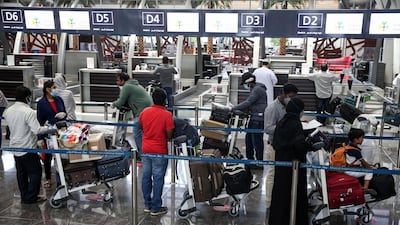I was made redundant due to Covid-19. The company bought me a repatriation flight ticket but my departure from the UAE was delayed due to the unavailability of flights. My flight was rescheduled to October 1 but I have found a job with another company. My previous employer is now demanding that I pay part of the flight ticket cost or a cancellation fee, which is 50 per cent of the ticket price.
Is this legal under the UAE law? I was advised to give them an undertaking that states they are no longer responsible for my repatriation. JD, Abu Dhabi
It is standard practice for a company to pay for a repatriation flight when they terminate an employee's contract and they leave the country.
This is covered in Article 131 of the UAE Labour Law: “The employer shall, upon the termination of the contract, bear the expenses of repatriation of the worker to the location from which he is hired, or to any other location agreed upon between the parties. Should the worker, upon termination of the contract, be employed by another employer, the latter shall be liable for the repatriation expenses of the worker upon the end of his service.”
It is unfortunate that a flight was not available for JD to leave but that is not her fault or responsibility. No employer is permitted to pass on employment-related costs to any employee, so the previous employer cannot demand any payment towards the cancellation fee.
I have questions related to VAT. In the first case, our customer’s head office is in Dubai and they placed an order for their branch in Saudi Arabia. On this order, we’ll collect VAT from the customer. We placed the order with a supplier in Saudi Arabia and charged him VAT. The Saudi supplier delivered the goods to our customer’s branch office. According to the intra-GCC VAT laws, can we claim the VAT paid to the supplier in Saudi Arabia and shall we pay input minus output VAT to the Federal Tax Authority in the UAE?
In the second case, the customer is based in the kingdom and places an order with us. We buy items from a supplier in Saudi Arabia, who then delivers the items to the customer in the kingdom. We collect and pay VAT as per Saudi regulations. Can we claim back the VAT paid to the supplier and should we pay the UAE FTA the output VAT minus input VAT? Would this be treated as out of scope?
In both of the above cases, there's no cross-border movement of physical goods as items are being sourced in Saudi Arabia and delivered there. HR, Dubai
The application of VAT can be complex and I asked Lisa Martin, a qualified accountant and owner of The Counting House FZE, for comment. She said: “It is not clear from the question whether the company is registered for VAT in the UAE and Saudi Arabia or just in the UAE. The special VAT treatment for intra GCC VAT supplies has not yet been implemented as not all GCC countries have introduced VAT. Until that time, supplies to other GCC countries are treated in exactly the same way as supplies to any country outside the GCC.
“In the meantime, they need to follow the rules of export of goods and services set out in the Decree Law and Executive regulations. In order to reclaim Saudi input VAT, a company needs to be registered there for VAT and submit Saudi VAT returns. A business cannot net off Saudi input VAT against UAE output VAT as part of UAE VAT returns.”
I recommend that companies with such queries take professional advice from an accountant as making errors can lead to significant penalties.
I am from Afghanistan and am currently in Dubai on a visit visa. I have an international driving licence and want to know how many days I can drive a car here. ME, Dubai
When someone is visiting Dubai, they are permitted to drive a rented vehicle with the approval of the vehicle rental company. For many nationalities, an international driving permit is required in addition to a home country driving licence. There is no limit to the number of days a person can drive a rented vehicle if they are in the country on a valid visit visa. But if they accept a job offer, it is no longer possible to drive on a foreign licence. Instead, they must apply for a Dubai driving licence once the residency visa is issued. For some nationalities, it is a simple case of exchanging a licence while others must take lessons and a test.
Visitors and tourists are not permitted to drive personally owned vehicles unless they are a first-degree relative of the owner and they have the express permission of the insurance company.
Keren Bobker is an independent financial adviser and senior partner with Holborn Assets in Dubai, with more than 25 years’ experience. Contact her at keren@holbornassets.com. Follow her on Twitter at @FinancialUAE
The advice provided in our columns does not constitute legal advice and is provided for information only

